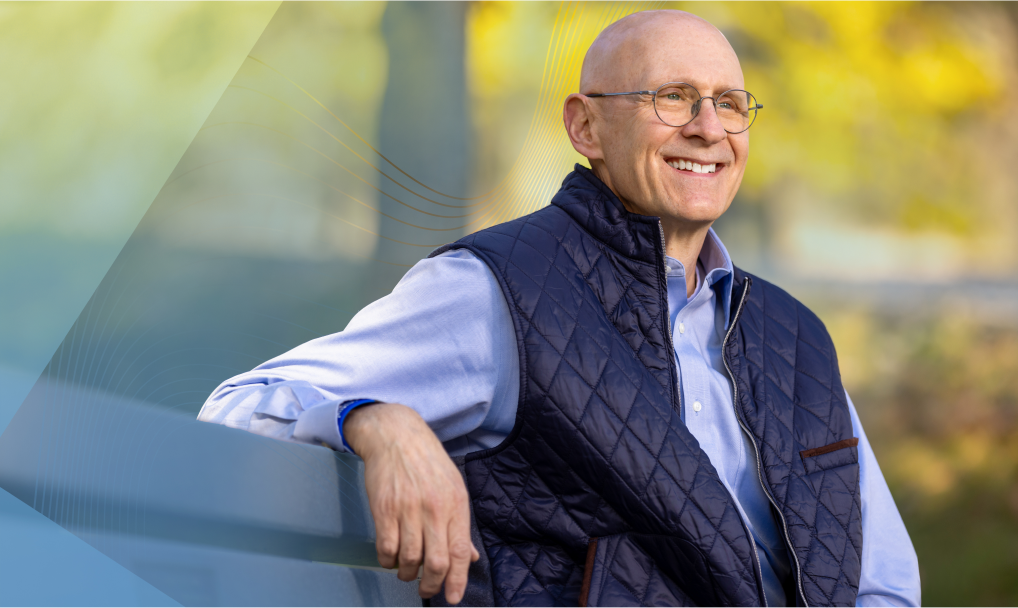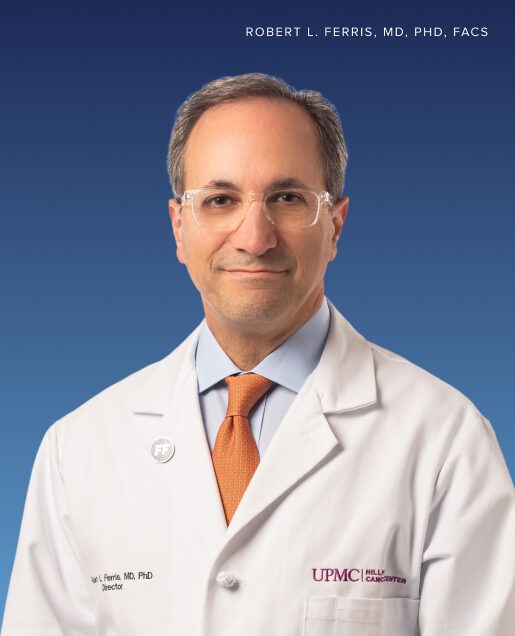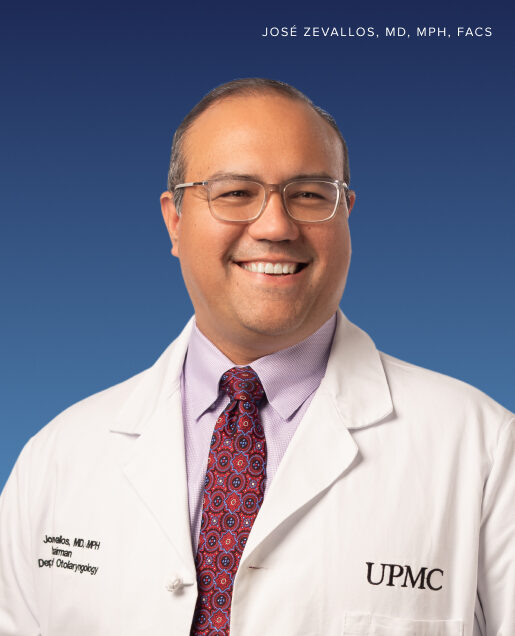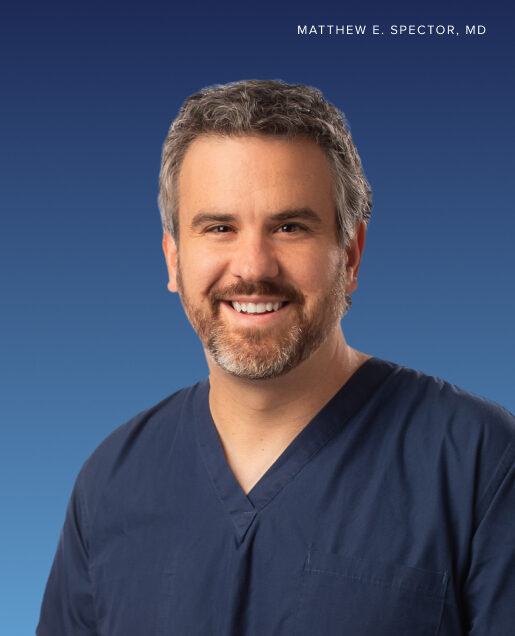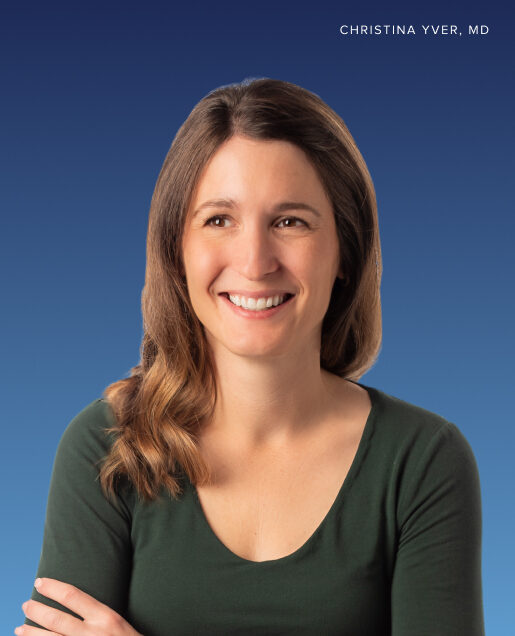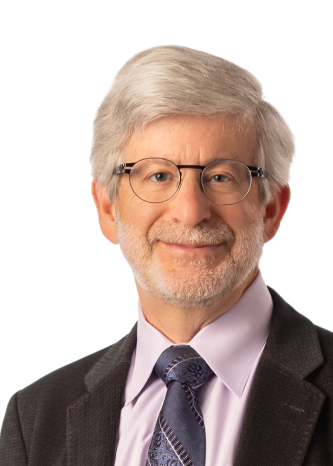“I’m actually a gastroenterologist,” says this positive, friendly, upbeat physician. “But I knew I’d better get this looked at.”
It turned out to be a malignant lymph node, and he was diagnosed with cancer of the right tonsil.
Robert L. Ferris, MD, PhD, FACS, head and neck cancer surgeon and director of UPMC Hillman Cancer Center, explains that cancers of the head and neck can include malignancies in the larynx, throat, lips, mouth, nose, jaw, and salivary glands. They account for nearly 4 percent of all cancers in the United States, and they are among the most complex to treat.
Fortunately, UPMC and the University of Pittsburgh offer patients an internationally renowned program in head and neck cancer care, built by oncologist and otolaryngologist Eugene N. Myers, MD, FACS, Emeritus Chair, Department of Otolaryngology, and former chair Jonas T. Johnson, MD, FACS, who has developed a preeminent survivorship clinic. (Otolaryngology, also called ENT, focuses on the ear, nose, and throat.)
Now the surgical part of that storied cancer care program is in the early stages of moving from Oakland to UPMC Shadyside — joining forces with UPMC Hillman Cancer Center to consolidate care.
“Bringing this program to Shadyside and UPMC Hillman Cancer Center is a tremendous advance in convenience for patients,” Dr. Ferris states. “It’s also a major undertaking because only part of head and neck cancer care is removing the tumor. The best treatment takes a team of renowned surgeons, highly specialized reconstructive surgeons, facial nerve specialists, high-quality nursing and inpatient management, world-class pathologists, expert radiation oncologists, speech and swallowing therapists, and more. At Hillman, our physician–scientists rapidly translate research findings into novel approaches for preventing, diagnosing, and treating cancer. We are proud to be the home of one of only five National Cancer Institute head and neck cancer SPOREs [Specialized Programs of Research Excellence].
“And,” Dr. Ferris adds, “we are very fortunate to have recruited José Zevallos, MD, MPH, FACS, chair of otolaryngology since 2022. His vision and energy are bringing this dream team together.”
I know I have the best
So it’s hardly surprising that when Dr. David Glorioso developed head and neck cancer, his physician recommended that he see Dr. Ferris.
“I have a strong faith,” Dr. Glorioso says. “I thought, ‘Hey, whatever happens, I’m going to put my faith in God. I’m going to put my faith in my caregivers. I know I have the best, and I’m going to get support from family and friends. I’ll be as positive as I can about this.’
“Everybody I saw, from Dr. Ferris to the radiation oncologists and the oncologists and their teams, supported me with compassion and great communication. They explained what they were planning for my treatment. I always felt like I had the final say in what would be done. I really appreciated that.”
Dr. Ferris removed the cancer using a robotic technique. “It was a big surgery,” Dr. Glorioso says, “but everything went well. Then I had radiation therapy, five times a week for six weeks. I still have a few issues with swallowing if I eat too quickly, because the radiation can damage the salivary glands and the muscles used in swallowing. But that has improved over the last two years.
“What impressed me throughout this experience was the incredible care from the doctors, the nurses, the physician assistants, nurse practitioners, all the employees and techs at Shadyside Hospital and the cancer center. They made me more aware than ever about the value of compassion and communication with patients and their families,” Dr. Glorioso says. “I learned a lot about that.
“The convenience of having all my care in one place was a definite plus,” he adds. “As is the continuity of care. I’ve had such close follow-up. A lot of times in medicine you may be cared for, but without continuity, you might then feel forgotten. I can value this more because I know as a physician how busy things are in medicine today, and how complicated our world has become. The attention to detail was great.”
Dr. Glorioso says his best advice is to “see fighting cancer as a fight that you have some control over and to make that fight a priority in your life. Place priority on nutrition and rest. Listen to the experts and those who have been through this. If they recommend that you do physical therapy for your mouth and neck three times a day, then find the time to do it. You have to take care of yourself.”
Vision: best in the world
Outgoing, energetic, Peruvian-born Dr. José Zevallos came to Pittsburgh in 2022. “It’s the honor of a lifetime to be the third chair of this preeminent Department of Otolaryngology,” he says.
“We are one of the busiest head and neck cancer programs in the country. We do on average about 200 of the most complex head and neck cancer cases a year. So it is a monumental lift to move the program to Shadyside — but I believe that since we’re starting with an already great department, then our goal is to be the best in the world. That sounds lofty, but the reality is that it’s well within reach.”
Dr. Zevallos explains that “head and neck cancer often involves big operations that can require removal of a portion of the jaw bone or the tongue or the voice box. Patients need very sophisticated reconstructive surgery and postoperative care. Afterwards, these patients commonly receive radiation therapy and chemotherapy. And so they’re seeing multiple doctors on multiple days at different locations. That’s frustrating, especially if they’re coming from any distance away. It would be so much easier if we were co-located at Shadyside and Hillman. We could ensure that patients get access to all the specialties in one location and fluidity in terms of enrolling in clinical trials.
“That’s the dream. And the advantage for patients is tremendous.”
Dr. Zevallos, who often performs complex robotic surgery for cancers of the throat, also works with thoracic (chest) surgeons who are already at Shadyside. “We share a lot, and it will be good to share the same hospital.”
Yet another reason for him to be at Shadyside is his research laboratory at Hillman Cancer Center, where he focuses on detecting new biomarkers in head and neck cancer.
